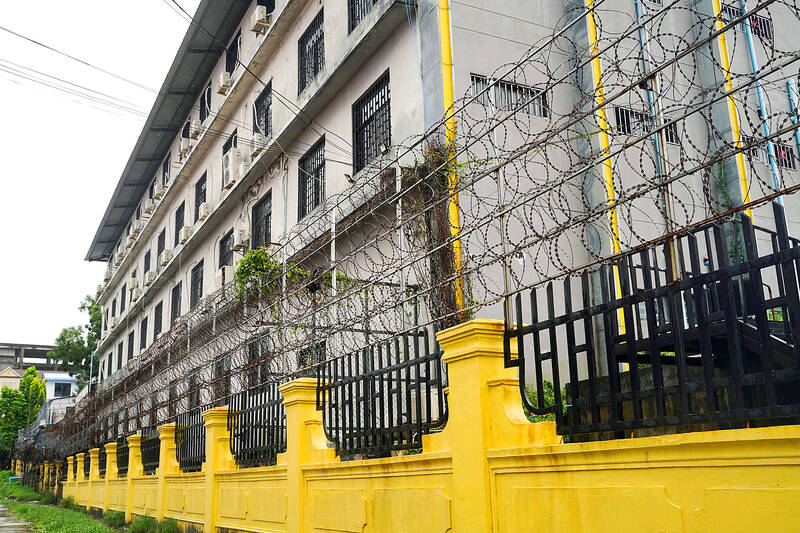Cambodian authorities said raids are underway this week at suspected cybercrime compounds across the Southeast Asian country, uncovering evidence of human trafficking, illegal confinement and torture.
Regional governments and human rights workers have heaped pressure on Cambodia in the past few months to rein in transnational crime rackets that traffic people into the country from across Asia and beyond to work in illegal gambling and linked scam call centers.
Taiwan’s Criminal Investigation Bureau earlier this month said that 11 Taiwanese who were among 373 believed to have been trafficked to Cambodia have returned.

Photo: Reuters
Cambodian officials have for months denied reports of abuses and trafficking, but senior officials including Cambodian Prime Minister Hun Sen have taken a harder stance in the past few weeks amid heightened media attention, ordering a crackdown on the shadowy scam operators.
Cambodian National Police spokesperson Chhay Kim Khoeun on Tuesday said that raids were ongoing and police would inform the public of the results when they were complete.
Authorities in the coastal town of Sihanoukville on Monday said they had found evidence of illegal gambling, illegal confinement, torture, prostitution, illegal possession of weapons, money laundering and human trafficking after a five-day operation targeting one business.
More than 8,000 phones, 804 computers, 36 passports and eight Tasers were confiscated, they said in a statement.
Similar raids were reported elsewhere through the weekend and into Monday.
Victims of the cybercrime racket, including many skilled workers with tech expertise, have said they were lured to Cambodia through social media advertisements promising high-paying jobs at casinos and hotels, but were then forced by racketeers to live in compounds and defraud strangers across the globe through Internet romance and cryptocurrency scams.
People who have fled such compounds in the past few months have reported being detained against their will under brutal conditions.
The UN human rights envoy to Cambodia, Vitit Muntarbhorn, last month said that victims were enduring a “living hell,” sometimes resulting in death.
He said that victims are being held in maze-like compounds surrounded by high walls and barbed wire, with no contact with the outside world and sometimes subject to torture for failing to meet the racketeers’ targets.
“There have been reports of tragic situations of victims fleeing by jumping from their walled buildings to try to escape,” he said in an article published in the Bangkok Post this month.
Cambodian and Thai authorities have previously said the wider racket is Chinese-run, but have not provided details.
Jeremy Douglas, the UN Office on Drugs and Crime representative for Southeast Asia and the Pacific, said the raids were a good start, but that the underlying causes needed to be addressed.
“It is fine to move on locations like we’ve seen in recent days, but if authorities react case-by-case, the groups involved will just jump to new locations and the situation won’t really change — these centers can be moved quickly,” he said.
Additional reporting by staff writer, with CNA

TIT-FOR-TAT: The arrest of Filipinos that Manila said were in China as part of a scholarship program follows the Philippines’ detention of at least a dozen Chinese The Philippines yesterday expressed alarm over the arrest of three Filipinos in China on suspicion of espionage, saying they were ordinary citizens and the arrests could be retaliation for Manila’s crackdown against alleged Chinese spies. Chinese authorities arrested the Filipinos and accused them of working for the Philippine National Security Council to gather classified information on its military, the state-run China Daily reported earlier this week, citing state security officials. It said the three had confessed to the crime. The National Security Council disputed Beijing’s accusations, saying the three were former recipients of a government scholarship program created under an agreement between the

Sitting around a wrestling ring, churchgoers roared as local hero Billy O’Keeffe body-slammed a fighter named Disciple. Beneath stained-glass windows, they whooped and cheered as burly, tattooed wresters tumbled into the aisle during a six-man tag-team battle. This is Wrestling Church, which brings blood, sweat and tears — mostly sweat — to St Peter’s Anglican church in the northern England town of Shipley. It is the creation of Gareth Thompson, a charismatic 37-year-old who said he was saved by pro wrestling and Jesus — and wants others to have the same experience. The outsized characters and scripted morality battles of pro wrestling fit

SUSPICION: Junta leader Min Aung Hlaing returned to protests after attending a summit at which he promised to hold ‘free and fair’ elections, which critics derided as a sham The death toll from a major earthquake in Myanmar has risen to more than 3,300, state media said yesterday, as the UN aid chief made a renewed call for the world to help the disaster-struck nation. The quake on Friday last week flattened buildings and destroyed infrastructure across the country, resulting in 3,354 deaths and 4,508 people injured, with 220 others missing, new figures published by state media showed. More than one week after the disaster, many people in the country are still without shelter, either forced to sleep outdoors because their homes were destroyed or wary of further collapses. A UN estimate

Australia’s opposition party yesterday withdrew election promises to prevent public servants from working from home and to slash more than one in five federal public-sector jobs. Opposition leader Peter Dutton announced his conservative Liberal Party had dropped its pledge that public servants would be required to work in their offices five days a week except in exceptional circumstances. “I think we made a mistake in relation to this policy,” Dutton told Nine Network television. “I think it’s important that we say that and recognize it, and our intention was to make sure that where taxpayers are working hard and their money is